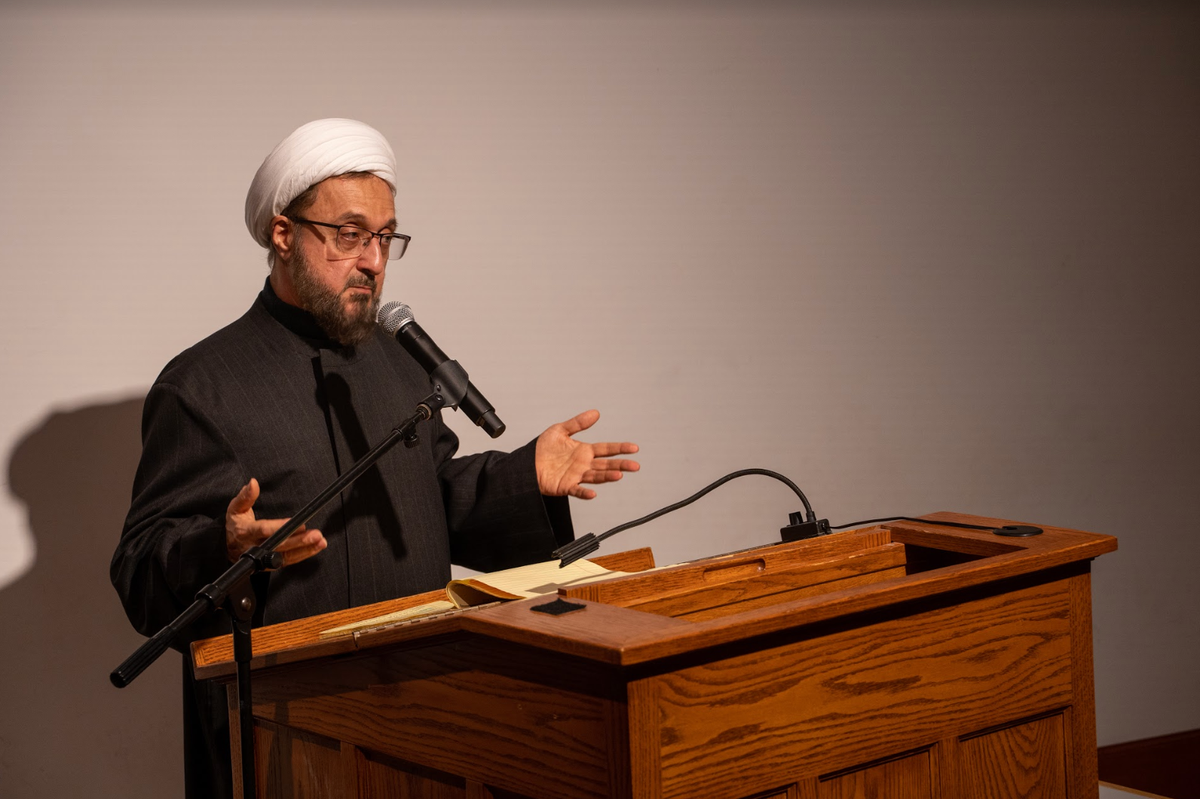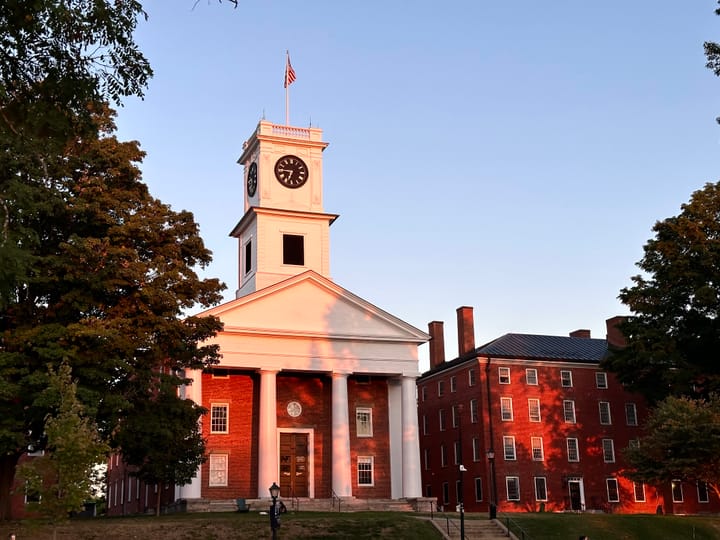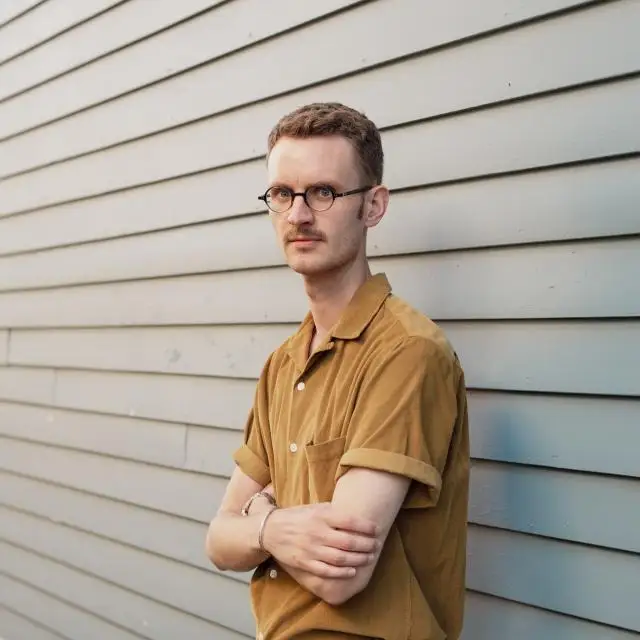Imam Kazerooni Discusses Human Rights, Islamic Law, Soleimani

Content warning: The following article contains explicit remarks regarding sexual assault that may be sensitive for some readers.
Imam Ibrahim Kazerooni gave a talk titled “Islamic Law and Human Rights” on Feb. 4. The talk, which was held in Pruyne Lecture Hall, was a part of the Office of Religious and Spiritual Life’s Interfaith Harmony Week.
Kazerooni is currently an adjunct professor at the University of Detroit Mercy and is the imam of the Islamic Center of America in Dearborn, Michigan, the largest mosque in North America. He holds an M.B.A. and a master’s of theological studies from the University of Denver, where he also earned his Ph.D. In 1974, Kazerooni was detained by Saddam Hussein’s regime for over five months. After his release, he completed his theological studies in Iran. Fearful of the Hussein regime’s secret police, he fled Iran for England before settling in Michigan.
The Muslim Student’s Association began the process of bringing Kazerooni to speak on campus after Ala Kaymaram ’21, a member of MSA, met Kazerooni over the summer and asked him to speak on campus. “We wanted to invite him before, but we had to work with the Office of Religious and Spiritual Life to do it,” Kaymaram said.
Director of Religious and Spiritual Life Harrison Blum began the event with remarks about the importance of interfaith dialogue. By engaging across differences, he said, we may learn more about ourselves and others.
At the beginning of the talk, Kazerooni remarked how he was initially surprised to see the offer to speak at the college. “I’d like to start by thanking the organizers. It took me back eight or so years ago when I applied for a position on the faculty. I didn’t hear anything back from Amherst at all. It was strange to get the invitation,” he said wryly.
Kazerooni then proceeded to address the event’s topic of human rights, noting the ways in which its implementation at times proves difficult. “There is not a country in the world that exists and doesn’t violate human rights. If not economic human rights, then political or social rights,” he said.
He recited a short anecdote to prove that no country, including the U.S., is innocent with regards to human rights violations. “Recently, [the U.S. has] new laws. The FBI, as well as the TSA, have been informed that any passenger who arrives at the border, [has] to … [be] screened to see if they are Muslims,” he said. “If they are, you must ask if they are Shias; if so, they must be dealt with separately. And yet, we are good at preaching to the rest of the world about human rights.”
“We preach well, but we do not practice,” he added.
Kazerooni concluded his lecture by touching upon the issue of justice. In the modern day, he said, scholars must turn to the religious texts to answer questions regarding justice and the law in a time when the Prophet Muhammed does not walk the Earth.
“This is a challenge before all of us. We need to work together. We must reflect on the texts … and start again,” he said. “Where is the concept of justice? Does it heal the law or does it fracture it. In Iran, there is a huge movement regarding repealing some of the old laws vis-a-vis gender [inequality]. It’s about time.”
Sabir Meah ’21, who attended the talk, said that Kazerooni’s talk made him reexamine the U.S.’s double standard of who is and isn’t a human rights violator. “It makes me think of why we don’t think of figures like George Bush in the same vein as Soleimani when his actions based on false pretenses led to the deaths of hundreds of thousands of Iraqi civilians,” he said in an email interview. Meah also pointed to Kazerooni’s “call for the discardal of old precedent and reinterpretation of Islamic law” as particularly intriguing.
A Q&A session followed Kazerooni’s talk and it quickly grew heated when Abraham Zuraw ’22 asked Kazerooni to elaborate on his past-comments regarding Iranian retaliatory measures against the U.S. following the assasination of Soleimani. Soleimani was the leader of the Quds Force, a unit of Iran’s Islamic Revolutionary Guard Corps (IRGC) notorious for its clandestine operations. The Quds Force was declared a terrorist organization by the U.S. in 2007. The Trump administration claims that Soleimani holds responsibility for the deaths of thousands of American soldiers, and assassinated him in a drone strike in Iraq on Jan. 3.
During a sermon given on Jan. 5, which sparked Zuraw’s question after he’d seen it online, Kazerooni stated that “the strategy for challenging the United States has already been set … We have no quarrel with American citizens. Our goal and target is American soldiers and American military people. All actors in the region must understand this be their strategy, although they have the free will to adjust their methodology of going about it … American soldiers become the sitting ducks.”
Kazerooni gave a sermon on the same day of Soleimani’s death at the Islamic Center of America. “The cowardly and heinous act of assassinating General Qasem Soleimani changed the plot [of my original sermon], and I would be doing a disservice if I did not address that issue first,” he said.
“[Soleimani’s] presence brought hope to the marginalized and to those who were afraid, and it brought hatred and fear to the enemies of Islam, particularly the United States … his importance was felt in the war in 2014 and 2015 against ISIS in Iraq in Mosul, where ISIS became an extended arm of American foreign policy,” he added.
Kazerooni responded to Zuraw’s question by asking the student, “if a martian battalion came down into your country and took your sister and your mother and they gang raped them, took pictures of them, of what they did to them, what is your response to it?”
“Those who have been violated in such a way want to take revenge, that is the natural way,” he added. “My political analysis of the situation is correct, and I stand by it.”
Blum, acting as the moderator of the discussion, intervened during the exchange. “I sadly don’t think it’s appropriate to use specifics, because specific violence has happened … If we could tone down the language of these acts toward women, not because they didn’t happen, but because … some language may be triggering … and certain people may want to continue this conversation,” he said.
Later in the Q&A session when asked how he felt about Soleimani’s human rights abuses, Kazerooni replied, “As [he was] somebody who was subjected to tyranny, I understand how he reacted.”
Zuraw ultimately expressed dismay towards Kazerooni’s answer to his question. “I don’t believe I should have to imagine my mother and sister being raped by martians after asking a challenging, but legitimate and civil question,” he said.
Meah thought the exchange of words took time away from other students who came to ask “thought-provoking” questions.
“While I do not agree with the Imam’s decision to not assign Soleimani individual blame because he is just a part of the colonization machine (and additionally I think his rape example was uncalled for and inappropriate), I think this long and heated exchange took much of the valuable time away from the students who wished to use the limited time we had for questions on the actual keynote topic,” he said.
“The students in the exchange were predominantly not even asking the Imam questions, but telling him how supposedly wrong his viewpoint was,” Meah added. In an email exchange with Zuraw obtained by The Student immediately following the event, Blum said, “I did find Kazerooni’s line of questioning on the more pointed side, and believe there are other ways he could have expressed those ideas. I apologize for not stepping in sooner to reframe the conversation.”





Comments ()